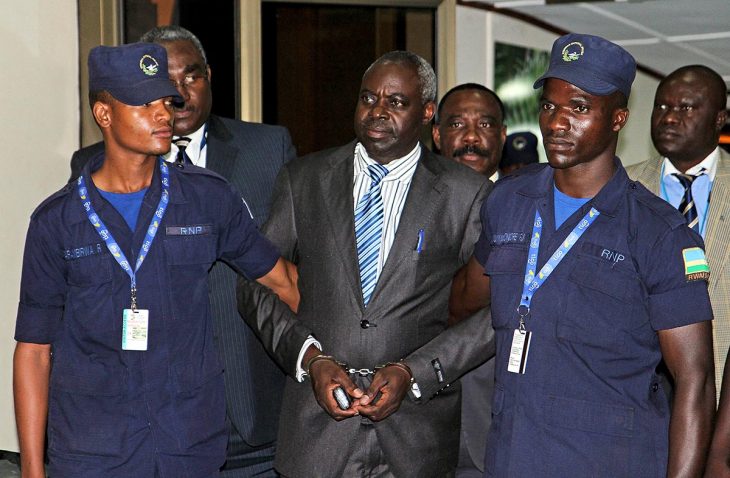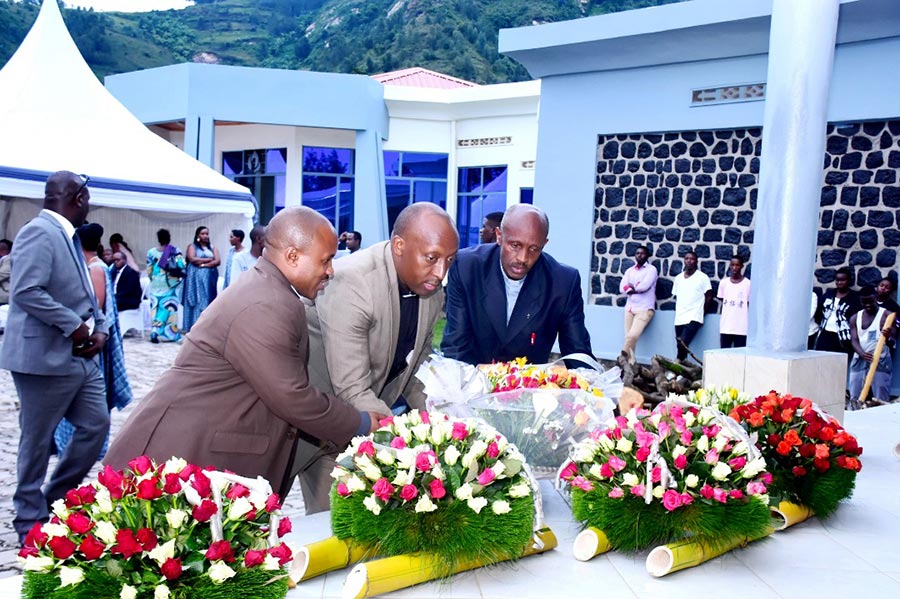In Rwanda, the surprising confessions of Bernard Munyagishari

Bernard Munyagishari, pictured here when he arrived in Rwanda in 2013, surprised everyone by pleading guilty after being sentenced to life imprisonment by a lower court. © Stephanie Aglietti / AFP
The case of Bernard Munyagishari is unique among those transferred to Rwanda by the former International Criminal Tribunal for Rwanda and other foreign jurisdictions. Sentenced to life by the trial court, Munyagishari caused a surprise during the appeals proceedings, pleading guilty to genocide. The parties expressed satisfaction. But the family and survivors are circumspect.
The tall, round-faced man in pink prison clothes appears alone on two giant screens and tries to soften the look of his red eyes, regularly adjusting his posture, as if he feels the gaze of his judges. At the Court of Appeal in Rwanda’s capital Kigali on November 12, 2020, the courtroom routine seems completely turned upside down by the Covid-19 pandemic. On hard wooden benches unkind to backs and buttocks that are reserved for the public wait less than a dozen media people, notepads and pens in hand, making not very tender comments about the man on the screen. A murmur goes up on these benches and on the podium, as if a little plot is being hatched. If it weren’t for the presence of the jurists and their endless protocol, you might think it was a session to settle a family dispute rather than a genocide trial. The nods of agreement and conspiratorial glances between the prosecutor and the accused’s counsel are in stark contrast to the cut-throat sessions that marked Bernard Munyagishari’s first-instance trial.
Suddenly, as if to end the suspense, the prosecutor answers the judge’s request for parties’ submissions: “It is no longer necessary, since Mr. Bernard Munyagishari has chosen to plead guilty.”
The media used to present the accused, now alone in his jail for the videoconference, as a hardened case. Now, the court is told, he is determined to take full responsibility for all the charges on which he was convicted at first instance, but prefers not to “say more without his lawyer by his side”. (Lawyers’ access to their clients in jail is limited following reported cases of Covid-19 in prisons).
“He has completely changed”
When the news falls in the courtroom, no one can believe their ears. “It’s a trick,” whisper the few journalists present, who are equally surprised. But in the months that followed, it turns out this was a real plea of guilt, long dormant before being awakened and negotiated without the media or public knowing.
“Yes, he has completely changed,” Jean-Claude Shoshi Bizimana, lead counsel for Bernard Munyagishari, told Justice Info. In a document called “Joint Conclusions of Bernard Munyagishari and the National Prosecuting Authority”, dated November 9, 2020, Munyagishari “accepts his responsibility, confesses his heinous acts, pleads guilty to the crime of genocide and asks for forgiveness”. The former head of the Interahamwe militia in Gisenyi, western Rwanda, admits his responsibility for recruiting, training and distributing weapons to the Interahamwe militia, for meetings to prepare and execute the genocide, for establishing and supervising roadblocks, as well as for various attacks, personal killings and those committed by his militia. He also withdrew all his other appeals, except for the one concerning his nationality (he has always denied his Rwandan nationality).
The prosecutor, for his part, “asks the Court of Appeal to take into consideration his confession” and recalls that “the sentence of life imprisonment can be reduced but cannot go below 25 years”.
“Painful gestation”
The defence, however, is asking for a reduced sentence of 15 years. It argues that the accused took the initiative to plead guilty of his own free will, repenting and asking for forgiveness. It asks the court to take into consideration that the accused has always been in “an unfavourable prison environment hostile to confessions”, both at the International Criminal Tribunal for Rwanda (ICTR), where he was first imprisoned after his arrest in 2011 (see box), and in Rwanda. In the ICTR prison, his former employers and leaders of the former presidential party, Edouard Karemera and Matthieu Ngirumpatse, as well as Colonel Anatole Nsengiyumva, all of whom were detained with him, reportedly warned him not to betray. “What would you gain by confessing and being convicted like Jean Kambanda?” they reportedly discouraged him, referring to the prime minister of Rwanda in 1994, who pleaded guilty at the ICTR but was sentenced to life in prison.
According to the allegations of the accused, relayed by his lawyer, this situation was repeated in Rwanda, where his new co-detainees – including Pastor Jean Uwinkindi, transferred like him from the ICTR, and Leon Mugesera, extradited by Canada – “organized meetings on subjects that were detrimental for him”. On July 2, 2019, Munyagishari negotiated, of his own accord and volition, his transfer from the “V.I.P.” wing of Mpanga Prison housing detainees transferred from the ICTR and foreign jurisdictions to Nyarugenge prison. This transfer, the defense argues, allowed Munyagishari to “clear the ground for his confession”.
With this first accused transferred from the ICTR and foreign jurisdictions now pleading guilty, the defense counsel “urges the court to establish in its judgment a precedent to encourage and guide other cases in the future”. He recalled the precedent of Omar Serushago, Munyagishari’s lieutenant and accomplice, who pleaded guilty before the ICTR and received 15 years in prison.
The proceedings, which were not made public, were closed on March 4. Over three weeks, the accused committed to paper his heavy burden of genocide. More than 50 pages describe planning, mobilization, organization, logistics, execution and supervision of the genocide. These are drawn from questioning punctuated by long “emotional moments”, such as over a “neighbour and friend killed when she could have been saved”. “It was a painful process, at the end of a difficult gestation period of ten years mixed with hardships, to finally give birth to the truth,” explains the lawyer, who affirms that his client always wanted to tell the truth “as agreed and promised to his family”.

Family torn between relief and anxiety
How does a family live with the weight of an accusation of genocide? “What could I have done about a problem I couldn’t solve?” answers MUJ, Munyagishari’s wife, who looks resigned and wishes to remain anonymous. When she returned from exile around 2000, alone with their children, MUJ left her husband in the Democratic Republic of Congo (DRC), on Rwanda’s western border. She did not know the circumstances of her husband’s arrest. When she returned to Rwanda, she claimed that he was dead and that she had buried him herself, according to neighbours. MUJ chooses to live far from where her family had lived. She returned to live in the shadow of her father’s family. “I was afraid for our safety in Gisenyi,” she says to justify her choice. She never goes into liquor stores. Instead, she is visible in civic activities such as being the head of Isibo (the smallest administrative entity in Rwanda, consisting of 15 households) and volunteering at the national electoral commission.
“I have accepted everything and only Jesus helps me carry this heavy cross,” she says, but it was “the children who suffered the most,” she adds, without saying more. What does her husband’s confession mean to her as a mother and wife? “It surprises me because I did not know he was guilty of something,” she says, weighing her words. “I saw him leave in the morning and come back at night. Could I have known what he had done outside?” She explains that their family had “hidden and evacuated three young men to Zaire”, the present-day DRC. But as a devout parishioner of the Methodist church, she said she is happy her husband is repenting, and that it would relieve his conscience of a heavy burden. What if her husband were to get out of prison one day? At this prospect, fear seems to return to her, her smile fades, her face darkens and she blurts out: “He should be relocated, far from the possible revenge of the survivors and those he may have betrayed by denouncing them.”
Cautious reaction of Ibuka and survivors
Ibuka, a collective of associations of genocide survivors, is initially sceptical about Munyagishari’s plea of guilt. “What does this add to what we already know?” asks its commissioner for legal affairs, Karinda Jean Damascène. For him, the answer to the question matters a lot. As long as this guilty plea “sheds light on the grey areas in the planning and organization of the genocide, Ibuka welcomes this turnaround by the accused, however late it may be”. For the association, the big winner in these proceedings is undoubtedly the prosecutor, since the accused, given his stature and contacts, may provide information that could help the prosecution in other cases, such as that of Félicien Kabuga, alleged financier of the Rwandan genocide, who is awaiting trial before a UN tribunal reactivated in Tanzania for the occasion. The other winner would be “the accused himself, who could have his sentence reduced and be released from prison one day”.
The position of Innocent Kabanda, a survivor of the Gisenyi massacres, seems to sum up the feelings of the survivors: “Neither the arrest nor the harshest sentences handed down to the genocidaires can give us as much comfort as the truth about what happened and where the bodies of our people were thrown. Does Munyagishari’s confession provide an answer to all this?” If not, “it would be pure acting, with the sole intention of getting him out of prison. We’ve seen too much of that with the gacaca courts,” he says, referring to the village courts that tried more than a million Rwandans a decade ago.
Head of the interahamwe militia in Gisenyi
Born in 1958 in North Kivu, Democratic Republic of Congo (DRC), Bernard Munyagishari acquired Rwandan nationality in 1978. From 1983 to 1990, this teacher by training worked at the Sonatubes company as a customs administrator. He was also in charge of the political animation group for the former single party MRND. From 1990 to 1992, he was assigned to the MRND personnel department. Quickly noticed for his leadership qualities, he was appointed secretary general of the party and president of the Interahamwe, the party’s youth wing, for the prefecture of Gisenyi, in western Rwanda.
When everything descended into chaos in April 1994, it was his Interahamwe who spearheaded the genocide of the Tutsis in his region. In July 1994, Munyagishari took refuge in his native country, about 50 kilometres west of Goma, in North Kivu. He was one of the first defendants sought by the International Criminal Tribunal for Rwanda (ICTR), which the UN set up at the end of 1994 in Tanzania. He remained on the run for 16 years before being arrested on May 25, 2011 in the DRC and handed over to the ICTR. He pleaded not guilty before being one of the few defendants of the UN Tribunal, which was closing its doors, to be transferred to Rwandan justice. From March 2016, Munyagishari boycotted his trial, in which the verdict was handed down on April 20, 2017. Absent from the courtroom, he was found guilty of genocide and sentenced to life in prison.
List of people transferred or extradited to Rwanda
- Transferred from the ICTR
- Munyagishari Bernard, transferred by the ICTR in July 2013, sentenced to life in April 2017, pleads guilty on appeal and is awaiting judgment.
- Ntaganzwa Ladislas, transferred by the ICTR in March 2016, sentenced to life in May 2020, awaiting his appeals hearings.
- Uwinkindi Jean, transferred by the ICTR in April 2012, life sentence confirmed on appeal, review underway.
- Extradited to Rwanda
- Bandora Charles, extradited from Norway in March 2013, sentenced to 30 years in jail after appeal.
- Birindabagabo Jean-Paul, extradited from Uganda in May 2017, sentenced to life, appeal under way.
- Kagaba Enos, extradited from the United States in May 2005, sentenced to life in October 2011 by a gacaca court.
- Kwitonda Jean-Pierre, extradited from Uganda in November 2010, sentenced to life by a gacaca court, review process under way.
- Iyamuremye Jean-Claude, extradited from the Netherlands in November 2016, judgment under deliberation.
- Mbarushimana Emmanuel, extradited from Denmark in July 2014, sentenced to life, appeal under way.
- Mudahinyuka Jean-Marie Vianney, extradited from the United States in January 2011, sentenced to life.
- Mugesera Léon, extradited from Canada in January 2012, sentenced to life after appeal, request for review under way.
- Mugimba Jean-Baptiste, extradited from the Netherlands in November 2016, judgment under deliberation.
- Mukeshimana Marie-Claire, extradited from the United States in December 2011, sentenced to 19 years in jail.
- Munyakazi Léopold, extradited from the United States in September 2016, sentenced to life, acquitted on appeal, serving a nine-year prison sentence for “revisionism”.
- Munyaneza Jean de Dieu, extradited from the Netherlands in March 2015, sentenced to 15 years in jail by a gacaca court, review proceedings under way.
- Nkundabazungu Augustin, extradited from Uganda in August 2010, sentenced to life by a gacaca court.
- Ntamabyariro Agnès, arrested and mysteriously brought back from Zambia in 1997, sentenced to life imprisonment, appeal to the Supreme Court pending.
- Seyoboka Henry Jean Claude, extradited from Canada in November 2016, sentenced to life, appeal under way.
- Twagiramungu Jean, extradited from Germany in August 2017, trial under way.
- Twagirayezu Wenceslas, extradited from Denmark in December 2016, trial under way.
Source: justiceinfo.net

